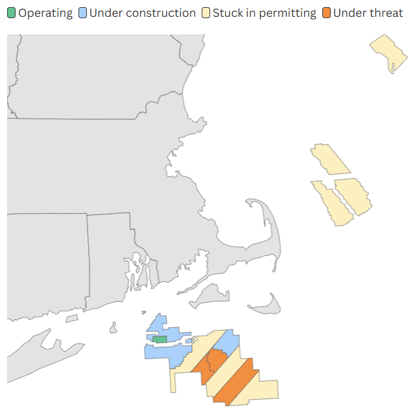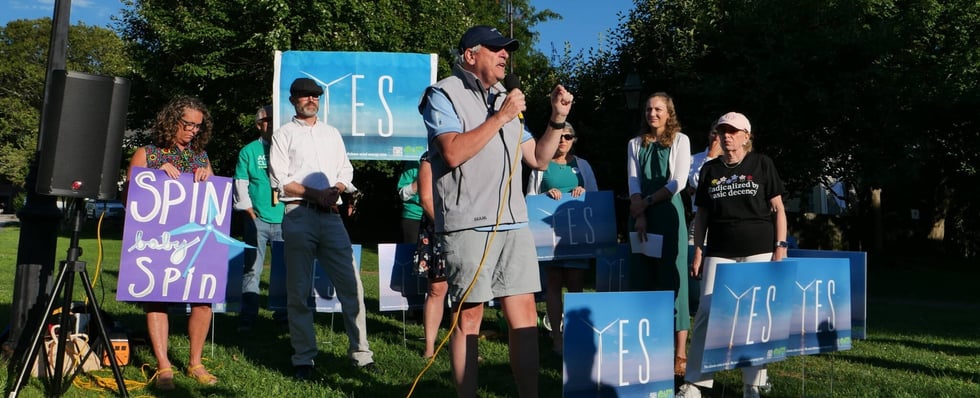On his first day in office, the president issued an executive order halting the future permitting and leasing of all offshore wind projects. That action alone was damaging—and is currently being challenged by 18 state attorneys general. But since then, the administration has escalated to an all-out assault on offshore wind.

In just the past few weeks, it has issued an unlawful stop-work order on the fully permitted and 80% constructed Revolution Wind project, slashed funding for critical port infrastructure, and filed court challenges seeking to revoke permits for New England Wind 1 & 2 and SouthCoast Wind. This map from WBUR shows which projects are being targeted.
This should come as no surprise, but Green Energy Consumers Alliance stands with the states, developers, workers, and vendors whose jobs and businesses are now at risk from these reckless actions. It should be clear to everyone that the Trump administration is working to intimidate clean energy developers and advocates. They want clean energy financiers to pull out. Why? Simply because the administration recognizes the great potential for offshore wind, solar, electric vehicles, and other forms of clean energy to reduce our consumption of fossil fuels. We want to highlight just how reckless these actions are, why we must push back, and what steps states must simultaneously be taking while fighting for these projects to move forward.
Impacts On Grid Reliability
ISO New England, the independent operator of our regional grid, has emphasized that Revolution Wind is already included in its near-term and future reliability planning. A halt to the project, ISO‑NE warns, “will increase risks to reliability” just as this vital clean power was expected to come online.
Not Building Offshore Wind Is The Real National Security Threat
On August 22nd, the Bureau of Ocean Energy Management (BOEM) vaguely claimed in a letter to Orsted that the stop work order was to protect national security. That is bogus, or “silly”, according to a former military commander. Offshore wind would greatly enhance our national security. Our overreliance on volatile fossil fuels that leaves us exposed to global price shocks and geopolitical events is the real security threat.
Revolution Wind received approval for its Site Assessment Plan by BOEM in 2020 during Donald Trump’s first administration. At the appropriate time in the process, the military did not object to the siting.
Trump Is Robbing Ratepayers To Enrich Fossil Fuel Companies
By halting and delaying offshore wind projects, the Trump administration is driving up energy costs across New England. Revolution Wind was contracted at about 9.8 cents per kilowatt-hour—an excellent price—saving Rhode Island ratepayers an estimated $90 million over the life of the contract.
Daymark Energy Advisors found that if 3,500 MW of offshore wind had been online last winter, New England ratepayers would have saved about $528 million—$400 million in lower wholesale energy costs plus $128 million in avoided capacity costs. Even just 700 MW (the size of Revolution Wind) would have saved consumers roughly $100 million. Instead, by blocking projects already permitted and under construction, the administration has forced families and businesses to keep paying inflated prices to fossil fuel generators.
Blocking Offshore Wind Costs Us Jobs & Economic Growth
The impact goes far beyond electric bills. Rhode Island, Connecticut, and Massachusetts were set to reap major economic benefits from Revolution Wind—union jobs, investments at ProvPort and Quonset, and facility upgrades in Connecticut. Offshore wind is not just clean power; it’s an economic development engine with a proven multiplier effect. By canceling and delaying projects, the administration has stolen both savings from ratepayers and paychecks from local workers, handing the benefits instead to fossil fuel companies. It’s a double hit: consumers lose affordable energy, and communities lose well-paying jobs and long-term growth.

RI Attorney General Peter Neronha speaking at CARI Yes to Revolution Wind rally on Aug 26. Photo credit: Climate Action Rhode Island.
What Can Be Done?
Thankfully, Orsted, Rhode Island, and Connecticut, are all challenging the stop work order in court. But note that Revolution Wind is not an isolated case. The Trump administration has repeatedly taken illegal actions to stop the transition away from fossil fuels, prompting litigation across the country, including Rhode Island and Massachusetts. All of these cases are important both with respect to their individual merits and in terms of upholding the rule of law.
The administration’s hostility towards U.S.-made renewable energy is not limited to offshore wind. There is now a tariff on all energy imported from Canada, including hydro, which could meet about 20 percent of Massachusetts electricity needs. At the same time, the Trump administration is mandating that uneconomic coal plants stay open, at a cost to ratepayers of over $3 billion per year. The administration is also doing all it can to increase exports of liquefied natural gas (LNG) and that will cause price increases for gas consumed domestically, either for heating or power generation. Put it together, and it’s obvious that the administration is taking every action it can to worsen our overdependence on fossil fuels with no regard for the climate or energy affordability.
Offshore Wind Is Critical But It’s Not Our Only Climate Action Lever

Photo Credit: Climate Action Rhode Island
Despite the current situation, offshore wind will ultimately be New England’s leading source of electricity, and the sooner we get there, the better. But even if the Trump administration delays progress in offshore wind, there are other strategies that Massachusetts and Rhode Island can and must execute in order to reduce our consumption of fossil fuels. These are policies that are state-based and are far less vulnerable to federal obstruction and must be pursued aggressively:
- Renewable Portfolio Standards to procure other clean energy resources
- Building Performance Standards to reduce emissions from the built environment
- Clean Heat Standards to accelerate the transition to clean heating
- Transportation policies, including expanded electric vehicle (EV) charging infrastructure and state rebates for the purchase of affordable new and used EVs.
States Must Continue To Lead
Our point is that states such as Rhode Island and Massachusetts must not backslide on their greenhouse gas emissions policies based on the excuse that offshore wind is taken off the table for now. We applaud our leaders in state government for standing up to the Trump administration on offshore wind and other issues. However, of the big three sectors in the economy, transportation is first in terms of emissions, followed by buildings. The electricity sector is now third, thanks to clean electricity standards.
What this means is that the states, while fighting for offshore wind, must simultaneously execute a host of other policies that would move the needle on emissions and protect consumers from fossil fuel price inflation. It’s sad but true that the transition from fossil fuels to clean energy has turned into a battle on many fronts, and we need to fight them all.



Comments